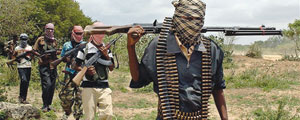
ISLAMISTS are growing in strength in this region of Africa.
Our Correspondent
Activation of militants of extremist groups in Mali, against whom the government forces and French troops are fighting and the recent hostage-taking in the natural gas field in Algeria suggest that this concerns the international community which is forced to take extreme measures in connection with the new front of struggle against radical groups.
There is growing worldwide concern about North Africa to be a new Afghanistan, where the Islamic militant groups — al-Qaeda supporters — freely carry out terrorist raids and can even capture vast territories, setting up their arrangements there.
At present, as the British The Independent notes, “militants hold control over the northern half of Mali, they have in view Mauritania and Niger, rich in mineral resources, and the ultimate goal may become the oil-rich Nigeria”.
There are more voices on the need for a common strategy to fight terrorism and extremism. Particularly, Washington, London and Paris are already discussing the possibility of a long-term co-ordinated campaign throughout the north of the African continent.
It is not ruled out that the operation in Mali, which involves France and the Economic Community of West Africa States, can be a prologue to an even more large-scale foreign intervention. Benin President and former African Union Chairperson Boni Yayi has called for the involvement of all Nato members in a military operation in Mali.
In due time, Winston Churchill called North Africa “the soft underbelly of Europe”.
- Chamisa under fire over US$120K donation
- Mavhunga puts DeMbare into Chibuku quarterfinals
- Pension funds bet on Cabora Bassa oilfields
- Councils defy govt fire tender directive
Keep Reading
It was reminded by former British Foreign Secretary Malcolm Rifkind, noting that “raids of the supporters of the al-Qaeda terrorist network constitute a threat to both the North African region, and neighbouring Europe.”
“The recent events in Mali and Algeria, and the threat to security and respect for human rights in the Mediterranean Region became the topic of discussion in the Parliamentary Assembly of the Council of Europe.
A specially prepared report notes that the situation in Mali and the high risk of establishing in the Sahel zone a mode, which deals with terrorism, hostage-taking, drug and arms trafficking, poses a serious threat to stability in the Mediterranean region and Europe as a whole and in the entire world community.”
Nato Secretary-General, Anders Fogh Rasmussen in an interview with the Danish Press said in turn that “the terrorist and extremist groups, criminal organisations, whose aim is to take hostages in the region, can obviously be a direct threat to Europe if they are not stopped.”
British Prime Minister David Cameron, too, pointed the importance of addressing the problem of instability in North Africa.
“The world must unite against this threat in North Africa, as well as we must unite against the same threat in Afghanistan and Pakistan,” said the Prime Minister, referring to the taking of hostages in Algeria by Islamic militants, who killed dozens of foreign nationals.
“We must work together, utilise all the means at our disposal to defeat the terrorists and eliminate space where there is anarchy,” said Prime Minister, stressing that “this is a global threat and it is necessary to give it a global response.”
The US administration also points the importance of taking more decisive action. Washington considers possibility of redirecting drones currently involved in destruction operations against the leaders of al-Qaeda in Pakistan and militants in Yemen, to the Maghreb countries.
The head of the Pentagon, Leon Panetta has threatened to punish the terrorists, saying they will not be able to escape from punishment, wherever they are hiding.
Experts recognise that the fight against the threat of terrorism in North Africa will take years or even decades. The vast expanses of the Sahara Desert become a zone of operations of the Islamist militias that have actually launched a Jihad. Their raids are reported in many countries in the Sahel Region, from the Atlantic to the Indian Ocean. The tragic events in Algeria are confirmation of this.
They were regarded in the world as a demonstration of force by Islamists associated with al-Qaeda. Particularly, one of the demands the Algerian terrorists made was the termination of the French military operation in Mali.
Algerian security services operation to free a BP gas complex in Amenas with hostages has simultaneously demonstrated that Algeria from a casual observer to the events in neighboring Mali, where there is war against the Islamists who seized the north of the country, turns into a major anti-terrorist force in the region.
The national authorities do not want the Malian extremists to find refuge in Algeria after the defeat.











